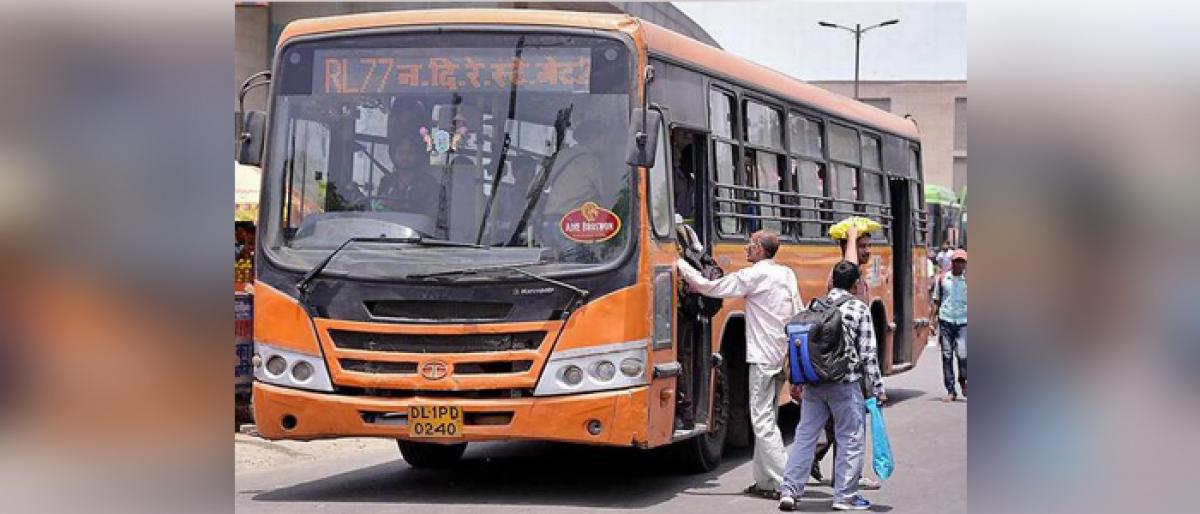Live
- UK PM Sunak again refuses to rule out July general election
- ‘Lovely experienced personal pain over last 2 to 3 months', says Congress leader Sandeep Dikshit
- YS Jagan cautions the people of NDA alliance, says they would deceive people
- SC to hear CM Kejriwal's plea against ED arrest on Monday
- Ayurvedic medicines seized in Telangana over misleading ads
- Ballia SP candidate booked for spreading hatred, threatening official
- Brother-sister want to take away property & mangalsutra for their vote bank, won’t allow it, says PM Modi
- Citizens of Bengaluru, why are you so indifferent to exercise your right to vote?
- Ad-free movies in theatres?
- Warangal: Nataraja in the eye of a needle
Just In
AAP govt, DTC seek HC nod to buy 500 standard floor buses


The AAP government and DTC on Wednesday urged the Delhi High Court to permit procurement of 500 standard floor buses for the national capital, saying that these vehicles were primarily meant for rural areas on the city outskirts where the roads were poor
New Delhi: The AAP government and DTC on Wednesday urged the Delhi High Court to permit procurement of 500 standard floor buses for the national capital, saying that these vehicles were primarily meant for rural areas on the city outskirts where the roads were poor.
The Aam Aadmi Party (AAP)-led government and the Delhi Transport Corporation (DTC) told a bench of Chief Justice Rajendra Menon and Justice V K Rao that the standard floor buses, proposed to be procured, were disabled-friendly as they would have hydraulic lifts for easy access to the differently-abled persons.
The proposed procurement was opposed by a differently-abled person, Nipun Malhotra, who has moved two PIL petitions challenging the Delhi government and the DTC's decision to buy 2,000 standard floor buses (SFBs) instead of the low floor buses (LFBs) for the national capital.
After hearing arguments of both sides, the high court reserved its decision on the procurement of 500 SFBs.
Malhotra, represented by advocate Jai Dehadrai, contended that SFBs were not disabled-friendly as they were mounted on truck chassis and their height prevented differently-abled persons from boarding them.
Dehadrai also contended that lack of good roads in the rural areas cannot be a reason for buying SFBs as there would be disabled persons in the villages and the government was responsible for ensuring good roads.
Advocate Aman Panwar, appearing for Congress leader Ajay Maken who has also opposed the procurement, said that according to the DTC itself, LFBs were more advanced and safer than SFBs.
Dehadrai also argued that as per the Ministry of Urban Development's harmonised guidelines of 2016, LFBs with ramps were required, instead of SFBs with hydraulic lifts.
He also contended that the harmonised guidelines have been upheld by the Supreme Court while allowing procurement of 500 SFBs by Delhi government as an interim measure.
The Supreme Court on August 2 had allowed the Delhi government and DTC to go ahead with procurement of 500 SFBs, out of the 1,000 proposed to be bought, and had said that the high court would decide regarding the remaining.
The apex court had permitted procurement of 500 SFBs as an interim measure to take care of "pressing needs" of commuters using public transport in the city, after the Delhi government assured that hydraulic lifts would be installed in the buses to make them accessible by disabled persons.
The contention of the petitioner was opposed by the Delhi government and DTC which claimed that procurement of SFBs was a "dire need" as its fleet of buses was facing a 40 per cent shortfall.
The DTC also said that currently 66 per cent of its fleet was disabled-friendly and after procuring of the 500 SFBs, the percentage would still be more than 50 per cent.
It said that procurement of LFBs was not feasible economically as they were costly and their annual maintenance cost, as quoted by the supplier, was "unrealistically high".
The Delhi government contended that no statutory scheme was being violated by the procurement of SFBs and added that states had the power to decide the height of buses plying on its roads.
After hearing arguments of both sides, the high court reserved its decision on the procurement of 500 SFBs.

© 2024 Hyderabad Media House Limited/The Hans India. All rights reserved. Powered by hocalwire.com






